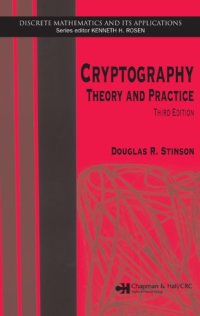THE LEGACY… First introduced in 1995, Cryptography: Theory and Practice garnered enormous praise and popularity, and soon became the standard textbook for cryptography courses around the world. The second edition was equally embraced, and enjoys status as a perennial bestseller. Now in its third edition, this authoritative text continues to provide a solid foundation for future breakthroughs in cryptography. WHY A THIRD EDITION? The art and science of cryptography has been evolving for thousands of years. Now, with unprecedented amounts of information circling the globe, we must be prepared to face new threats and employ new encryption schemes on an ongoing basis. This edition updates relevant chapters with the latest advances and includes seven additional chapters covering:
Pseudorandom bit generation in cryptography Entity authentication, including schemes built from primitives and special purpose zero-knowledge schemes Key establishment including key distribution and protocols for key agreement, both with a greater emphasis on security models and proofs Public key infrastructure, including identity-based cryptography Secret sharing schemes Multicast security, including broadcast encryption and copyright protection THE RESULT… Providing mathematical background in a just-in-time fashion, informal descriptions of cryptosystems along with more precise pseudocode, and a host of numerical examples and exercises, Cryptography: Theory and Practice, Third Edition offers comprehensive, in-depth treatment of the methods and protocols that are vital to safeguarding the mind-boggling amount of information circulating around the world.Amazon.com Review Douglas R. Stinson's Cryptography: Theory and Practice is a mathematically intensive examination of cryptography, including ciphers, the Data Encryption Standard (DES), public key cryptography, one-way hash functions, and digital signatures. Stinson's explication of "zero-sum proofs"--a process by which one person lets another person know that he or she has a password without actually revealing any information--is especially good.
If you are new to the math behind cryptography but want to tackle it, the author covers all of the required background to understand the real mathematics here. Cryptography includes extensive exercises with each chapter and makes an ideal introduction for any math-literate person willing to get acquainted with this material.
